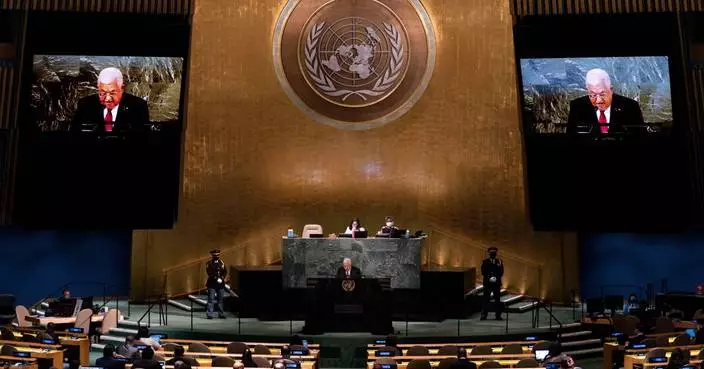The House intelligence committee on Monday released two transcripts of closed-door interviews with Michael Cohen, President Donald Trump's former personal lawyer, along with some exhibits from the testimony.
The committee's decision to release the transcripts came two weeks after Cohen reported to federal prison for a three-year sentence. Cohen pleaded guilty last year to campaign finance violations, lying to Congress and other crimes. He is the only person charged with a crime in connection with the hush-money payments made to women who allege they had affairs with Trump.
The transcripts are from interviews the panel conducted with Cohen in February and March. The vote to release them, which was held behind closed doors, was 12-7.
Much of the discussion during Cohen's interview was related to pardons and whether Trump or his lawyers were dangling them in front of Cohen as the government began to investigate him. The lawmakers were also interested in talking to Cohen about a false statement he delivered to Congress in 2017 about a real estate project in Moscow, questioning who may have edited that statement and whether he was directed to lie. Cohen provided documents to the panel about the editing process leading up to the statement.
In public testimony before a separate House committee in February, Cohen said Trump's attorneys, including Jay Sekulow, had reviewed and edited the written statement about the Moscow project. Cohen acknowledged in a guilty plea last year that he misled lawmakers by saying he had abandoned the Trump Tower Moscow project in January 2016, when in fact he pursued it for months after that as Trump campaigned for the presidency.
Cohen became a key figure in congressional investigations after turning on his former boss and cooperating with special counsel Robert Mueller's Russia probe. Mueller's final report, released in April, examined conduct related to Cohen as one of several possible instances of obstruction of justice by the president.
Mueller's team wrote in its report that Cohen told one of Trump's personal lawyers after an FBI raid on his home that "he had been a loyal lawyer and servant" and "he was in an uncomfortable position and wanted to know what was in it for him."
The report says that Cohen was told he "should stay on message, that the investigation was a witch hunt, and that everything would be fine." Cohen understood that to mean he would be "taken care of" if he stayed on message, whether through a pardon or by the investigation being shut down.
The Intelligence committee it also seeking more information about Cohen's 2017 testimony from four lawyers for the Trump family.
House Intelligence Committee Chairman Adam Schiff, D-Calif., said in a statement last week that Cohen's testimony this year, along with materials in the committee's possession, raises "serious, unresolved concerns about the obstruction of our committee's investigation that we would be negligent not to pursue."
The lawyers who received the requests are Sekulow; Abbe Lowell, lawyer for Ivanka Trump, the president's daughter, and her husband, Jared Kushner; Alan Futerfas, lawyer for Donald Trump Jr.; and Alan Garten, lawyer for the Trump Organization.
WASHINGTON (AP) — The Biden administration said Friday that Israel's use of U.S.-provided weapons in Gaza likely violated international humanitarian law but wartime conditions prevented U.S. officials from determining that for certain in specific airstrikes.
The administration's findings of “reasonable” evidence to conclude that its ally had breached international law in its conduct of the war in Gaza, released in a summary of a report being delivered to Congress on Friday, represent the strongest such statement from Biden officials.
But its caveat that it was unable immediately to link specific U.S. weapons to individual strikes by Israeli forces in Gaza could give the administration leeway in any future decision on whether to restrict U.S. provisions of offensive weapons to Israel.
The administration’s findings, a first-of-its-kind assessment that was compelled by President Joe Biden’s fellow Democrats in Congress, comes after seven months of airstrikes, ground fighting and aid restrictions that have claimed the lives of nearly 35,000 Palestinians, mostly women and children.
THIS IS A BREAKING NEWS UPDATE. AP’s earlier story follows below.
WASHINGTON (AP) — A soon-to-be-released Biden administration review of Israel's use of U.S.-provided weapons in its war in Gaza does not conclude that Israel has violated the terms for their use, according to three people who have been briefed on the matter.
The report is expected to be sharply critical of Israel, even though it doesn't conclude that Israel violated terms of U.S.-Israel weapons agreements, according to one U.S. official.
The administration's findings on its close ally's conduct of the war, a first-of-its-kind assessment that was compelled by President Joe Biden's fellow Democrats in Congress, comes after seven months of airstrikes, ground fighting and aid restrictions that have claimed the lives of nearly 35,000 Palestinians, mostly women and children.
Biden has tried to walk an ever-finer line in his support of Prime Minister Benjamin Netanyahu’s war against Hamas. He has faced growing rancor at home and abroad over the soaring Palestinian death toll and the onset of famine, caused in large part by Israeli restrictions on the movement of food and aid into Gaza. Tensions have been heightened further in recent weeks by Netanyahu’s pledge to expand the Israeli military’s offensive in the crowded southern city of Rafah, despite Biden's adamant opposition.
Biden is in the closing months of a tough reelection campaign against Donald Trump. He faces demands from many Democrats that he cut the flow of offensive weapons to Israel and denunciation from Republicans who accuse him of wavering on support for Israel at its time of need.
Two U.S. officials and a third person briefed on the national security memorandum to be submitted by Secretary of State Antony Blinken to Congress discussed the findings before the report's release. They spoke on condition of anonymity because the information was not yet public.
No further details were immediately available on the results of the administration’s review. A senior Biden administration official said the memorandum is expected to be released later Friday, but declined to comment on its conclusions.
Axios first reported on the memorandum's findings.
The Democratic administration took one of the first steps toward conditioning military aid to Israel in recent days when it paused a shipment of 3,500 bombs out of concern over Israel’s threatened offensive on Rafah, a southern city crowded with more than a million Palestinians, a senior administration official said.
The presidential directive, agreed to in February, obligated the Defense and State departments to conduct “an assessment of any credible reports or allegations that such defense articles and, as appropriate, defense services, have been used in a manner not consistent with international law, including international humanitarian law.”
The agreement also obligated them to tell Congress whether they deemed that Israel has acted to “arbitrarily to deny, restrict, or otherwise impede, directly or indirectly,” delivery of any U.S.-supported humanitarian aid into Gaza for starving civilians there.
Lawmakers and others who advocated for the review said Biden and previous American leaders have followed a double standard when enforcing U.S. laws governing how foreign militaries use U.S. support, an accusation the Biden administration denies. They had urged the administration to make a straightforward legal determination of whether there was credible evidence that specific Israeli airstrikes on schools, crowded neighborhoods, medical workers, aid convoys and other targets, and restrictions on aid shipments into Gaza, violated the laws of war and human rights.
Their opponents argued that a U.S. finding against Israel would weaken it at a time it is battling Hamas and other Iran-backed groups. Any sharply critical findings on Israel are sure to add to pressure on Biden to curb the flow of weapons and money to Israel’s military and further heighten tensions with Netanyahu’s hard-right government over its conduct of the war against Hamas.
Any finding against Israel also could endanger Biden’s support in this year's presidential elections from some voters who keenly support Israel.
At the time the White House agreed to the review, it was working to head off moves from Democratic lawmakers and independent Sen. Bernie Sanders of Vermont to start restricting shipments of weapons to Israel.
Israel launched its offensive after an Oct. 7 assault into Israel, led by Hamas, killed about 1,200 people. Two-thirds of the Palestinians killed since then have been women and children, according to local health officials. U.S. and U.N. officials say Israeli restrictions on food shipments since Oct. 7 have brought on full-fledged famine in northern Gaza.
Human rights groups long have accused Israeli security forces of committing abuses against Palestinians and have accused Israeli leaders of failing to hold those responsible to account. In January, in a case brought by South Africa, the top U.N. court ordered Israel to do all it could to prevent death, destruction and any acts of genocide in Gaza, but the panel stopped short of ordering an end to the military offensive.
Israel says it is following all U.S. and international law, that it investigates allegations of abuse by its security forces and that its campaign in Gaza is proportional to the existential threat it says is posed by Hamas.
Biden in December said “indiscriminate bombing” was costing Israel international backing. After Israeli forces targeted and killed seven aid workers from the World Central Kitchen in April, the Biden administration for the first time signaled it might cut military aid to Israel if it didn’t change its handling of the war and humanitarian aid.
Presidents Ronald Reagan and George H.W. Bush, in the 1980s and early 1990s, were the last presidents to openly hold back weapons or military financing to try to push Israel to change its actions in the region or toward Palestinians.
A report to the Biden administration by an unofficial, self-formed panel including military experts, academics and former State Department officials detailed Israeli strikes on aid convoys, journalists, hospitals, schools and refugee centers and other sites. They argued that the civilian death toll in those strikes — such as an Oct. 31 strike on an apartment building reported to have killed 106 civilians — was disproportionate to the blow against any military target.

Palestinians mourn their relatives killed in the Israeli bombardment of the Gaza Strip, at a hospital in Rafah, Gaza, Friday, May 10, 2024. (AP Photo/Ismael Abu Dayyah)

U.S. President Joe Biden boards Marine One at Moffett Airfield in Mountain View, Calif., Thursday, May 9, 2024. (Jose Carlos Fajardo/Pool Photo via AP)











